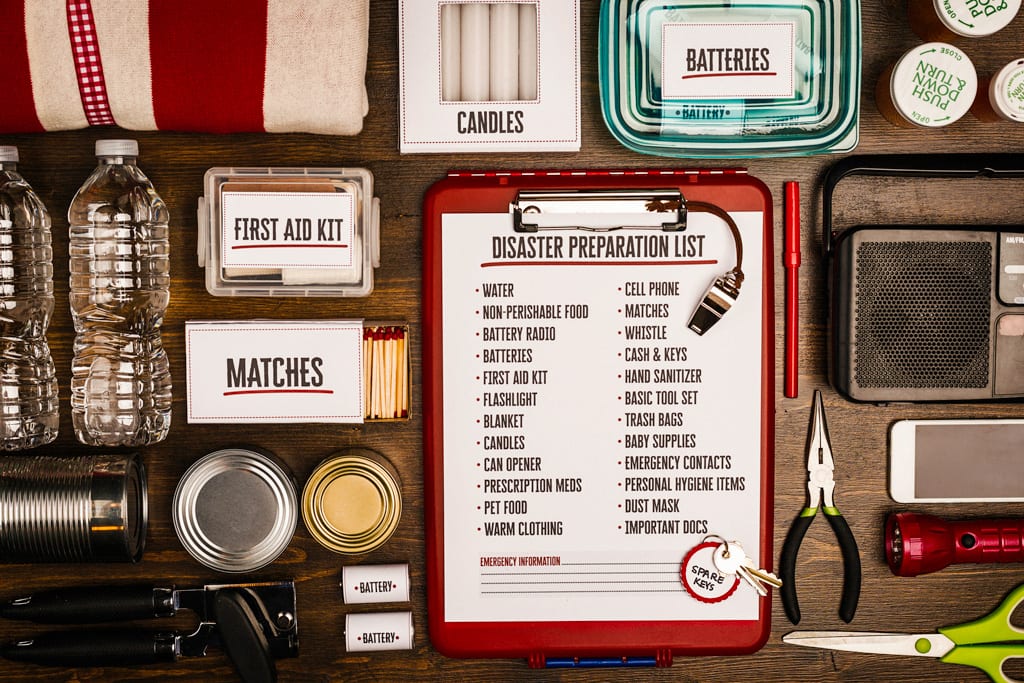Natural disasters are happening more often. Forest fires are ravaging the west coast. Massive volcanic eruptions forced thousands to evacuate in Hawaii. Whether it’s hurricanes, floods, or fires, emergency preparedness is important for everyone, but especially seniors and those with mobility issues.
Preparing for a disaster, natural or man-made, is not easy at the best of times. It can become even more complicated when you or your loved one have reduced mobility or cognitive capability. Here are some special things to think about:
Disaster supply kit
Make sure that you have a supply kit packed, ready, and in a convenient location. Supplies should last at least three days and be stored in backpacks or duffel bags. If you cannot readily lift a backpack, use a container that has wheels. Include a flashlight, battery-operated radio, multi-purpose tool and first aid kit. Make copies of all personal documents and put them in the kit. Include an extended battery and spare charger for your cell phone. A solar or hand crank charger might be a good idea. Also keep enough cash on hand. If you have pets, include pet food, vaccination records, and pet meds.
Medication
If your routine medication on 30-day refill scheduled, consider changing them to a 90-day refill schedule. It significantly reduces the chances of being caught short. Make and keep a list of all medications and dosages, with your doctor’s phone number. Many pharmacies will provide short-term emergency refills and most charts now electronic. Try to have at least a week’s supply of all medications on hand. If your medications are on a controlled schedule, talk to your doctor about the best way to handle it.
Emergency Contact
If you are elderly and live alone make arrangements for somebody to check on you immediately after a disaster and offer assistance. Show them where you keep your medication and emergency supplies. Telephones may not work and you may not have power, so set up multiple means of communication.
Know your escape route
If you live in an area that has certain kinds of disasters they often come from a predictable direction. For example, if you are in Florida, hurricanes tend to give lots of warning. Make sure you know a good way out regardless of the direction the storm hits. It is a good idea to arrange for evacuation transportation in advance, especially if you cannot drive.
Mobility Devices
Keep all of your mobility devices in the correct place when they are not in use and make sure they are easy for somebody to get hold of when needed. If you or your relative is bed-bound, make sure all caregivers know where their wheelchair is. Store hearing aids and glasses in a container secured with Velcro, especially if you live in an earthquake zone.
Pets and Service animals
If you have a service animal, it will be allowed to shelter with you. Otherwise, emergency public shelters do not take pets, so it is a good idea to make sure you know where you can take your pets or go with them. Pet-friendly hotels can be a good option.
Warning System
Make sure that you know how community warning systems work in your area. Is there a cellphone app that would be useful? Which stations broadcast on the EAS? If you live alone, especially in rural area, it might be a good idea to get a NOAA radio.
Plan for rescue
Before any disaster happens, talk to the local fire station. Make sure they know about any special concerns with you or your loved ones in case they need to evacuate you. If you live in a building with stairs and cannot use them to evacuate, make sure the fire station and building maintenance know about your needs. If you have to evacuate, let the shelter know about special needs right away.
Watch for scams
Elderly people are often targeted by scammers at the best of times and, sadly, some people will take advantage of a disaster. Be wary of people who offer to help fix your post disaster problems for a price.
Disaster preparedness is something most people have to consider. The nature of the disaster might vary, but almost every area may experience some kind of problem, whether it is earthquakes, hurricanes, problems with the power grid or, yes, volcanoes. ADT has create an interactive Natural Disaster map here, where you can find your area to see which natural disasters are common in your area.
Being prepared is the best way to keep you and your loved ones safe in case of a natural disaster.
Sources:
https://blogs.cdc.gov/publichealthmatters/…
